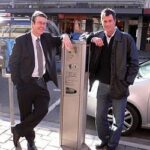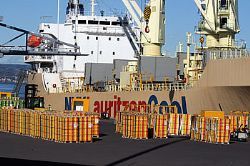Exploring greener frontiers
The incredible business adventures of Seeby Woodhouse recently entered a bold new chapter following the launch of Green Carbon. Ruth Le Pla talks to one of New Zealand’s most visionary young entrepreneurs.
Given that he’s got enough money to retire and then some, why would Seeby Woodhouse re-enter the business world? And what’s the link between the Internet and carbon credits? When Woodhouse launched his latest business venture, Green Carbon, earlier this year, the guest list sported an eclectic bunch of locals. They included New Zealand Institute CEO David Skilling; gossip columnist Bridget Saunders; National Party leader John Key; and model Nicky Watson. Woodhouse is best known as the Orcon Internet entrepreneur who sold out to Kordia Group in the middle of last year for a cool $24.3 million. That’s pretty unusual for a 30 year old. But then, not many business men revel in the name Seeby. It’s a made-up name, he says, inspired by his dad’s love of James Joyce’s book Finnegans Wake in which words are combined to take on new, often lyrical, double meanings. Woodhouse has a reputation as a man-about-town, ‘A’ list kind of a guy. He’s frequently photographed with cute young models and is on record for his work-hard/play-hard ethos. When we meet at his North Shore Auckland home, there’s a different persona. We’re sitting by his personal library. He has an entire wall lined with books: A tempting 500 or so books on politics, science, business and other random topics. There’s Noam Chomsky’s powerful book Failed States which deals with the United States’ assertion that it has the right to use military force against ‘failed states’ around the globe. And Edward Lear’s nonsense poem The Quangle Wangle’s Hat which Woodhouse says is part of his ‘nostalgia’ shelf from when he was a kid. He enjoys the ‘what if’ thinking of books, he says. “That’s how my brain works.” And reckons if the building was burning down he’d scramble for his copy of Niccolo Machiavelli’s The Prince before legging it out of there. Which is kind of interesting because Machiavelli was writing about the Florentine Republic of the 1500s, but there are arguments that his ideas can be applied just as well to modern day political life. Not that Woodhouse sees himself as a political creature. There were no political undertones in his invitation to John Key to the Green Carbon launch, he says. He doesn’t have any particular political affiliation and would have been just as pleased to have hosted Helen Clark. “We just asked John and he said yes. I don’t know why we asked him first. It’s just the way it worked out, but if Helen had said yes that would have been fantastic too.” The Prince, says Woodhouse, is one of those books that changes people’s opinions on how things work. “But every good book does that: they change your thoughts a little bit.” With a few exceptions, Woodhouse’s book collection is curiously thin on sci-fi. “It’s kind of funny,” he says, “because at Orcon all of the technical guys bar none had copies of Star Trek on DVD and came in [to the office] in their Klingon outfits and I never understood it.” Woodhouse clearly understood a lot about Orcon’s business: enough to spot the early opportunity in the Internet Service Provider (ISP) space when he was just a teenager and retire handsomely from it 10 years later. He set himself the goal of doubling the size of the company every year. Seven out of 10 years he did just that. Last year, he says, was a good time to sell Orcon. The market was ready to buy, he was ready to move on to something else “and it looked like things were going to get a lot tougher – which they clearly have”. “When you are in a new industry you can create some of the rules,” he says, “you can make lots of mistakes and go off on a tangent and do things. And if it doesn’t work you can still reverse around because there aren’t so many people in that space.” As the ISP space matured, Woodhouse felt the excitement diminish. “I was very good at shaving out as many costs and being as efficient as possible,” he says, “but the long-term winners were going to be whoever could answer the most calls per helpdesk person, who could pay their helpdesk people the lowest, and who could have the lowest costs. It all came down to grains of sand: shaving five cents off people’s bills, getting the most customers and doing advertising the most efficiently.” When we spoke on the phone a few months after the sale of Orcon he told me he was semi-retired. He was learning to dance and cook, playing the piano and buying furniture for his house. A few months after that, Woodhouse has re-emerged at the head of Green Carbon. It’s a start-up company dedicated to providing advice to businesses wanting to reduce their carbon footprint. It will also supply carbon offsets and invest in carbon-reducing projects around the world. For Woodhouse the lure of the ‘Wild West’ is rearing up again. He can’t resist the temptation to get involved in new frontiers, unbroken ground… the next big business adventure. Seeby sees green Seeby Woodhouse is ‘absolutely’ convinced that global warming is man made. “I don’t like to jump on the bandwagon,” he says, “so I started digging into this stuff…. biology, physics and calculus and statistics were all my subjects at school so that’s the kind of thing I read: New Scientist and Cosmos magazine. Science is one of my real passions…. I researched global warming because I didn’t want to back a horse that turned out to be a wrong bet and it’s all caused by sun spots or something.” Woodhouse says he got as far as doing his own calculations on the amount of heat that a CO2 molecule would absorb and how that works in terms of different amounts of radiation. He worked out enough to be convinced that scientists’ predictions of serious upcoming change were bang on. Woodhouse is resigned to living with the apparent contradictions of his new role. “I’ve had people tell me I should be driving a Prius,” he says. “But, hang on, I’ve already got a car. If I sell that car it’s just going to go to someone else who’s going to drive it in exactly the same way as me or worse. And the creation of a Prius is going to do more environmental damage because the energy required to create a new car – especially a car with heavy batteries and that sort of stuff – is way worse than the impact of just driving the car I’m already in.” Woodhouse contends that the problem lies at a much deeper level than one individual’s car. “The trouble with any Western person saying they drive a Prius is that it doesn’t matter,” he says, “because the average first world person consumes 35 times more resources than a third world person.” Woodhouse sees parallels with arguments surrounding the use of environmentally friendly light bulbs. “I’ve seen people go through their houses and say, ‘I’ll buy energy efficient light bulbs and I’ll throw out all my existing ones’. But the energy required to make that energy efficient light bulb was way more than just using an inefficient light bulb until it blows. So I say, if a light bulb is going to blow, sure I’ll replace it with an energy efficient one but don’t go through your house and throw out a whole load of good light bulbs and put them in landfill. “Yes, there are some really serious issues and I’d like to be part of the solution. No-one talks about how we could all drive huge ‘whale-tail’ American cars that are huge gas guzzlers as long as there weren’t so many of us on the planet. If there were a billion people we wouldn’t have all these environmental problems. “By the year 2050 we’re going to have nine billion people and they are all going to want to eat more protein. It’s just going to put a huge strain on resources – as there is already. Half the coral reefs have died and most of the world’s fisheries are in decline or collapsed already. And if crops yield 50 percent less because we’ve got global warming but we’ve got to feed 50 percent more people, I’m really concerned. “One of the scariest statistics I’ve ever seen is there’s less than two billion people in the world who you could class as having a first world standard of living. Four billion people in the world don’t have access to clean water or anything like that. So two thirds of the world is living in poverty and third world conditions. “The problem is huge. All I try and do is have a good understanding of the issues. I try to approach things from a real, rational, scientific viewpoint and hope that maybe one day I’ll do some good. If people want to criticise me that’s fine. “The problem we’ve got is that even if you lived like a very frugal Westerner, if you are a Westerner there’s still a problem because the planet can’t sustain the whole world living like we do now. “So either we need to invent new sources of energy and new sources of sustainability – which I think is the only way forward – or we need to drastically reduce the population. The coming times are going to be very scary so we need as many heads working on pollution as possible. “I like to know my topic. I certainly don’t think I’m an expert but I like to get to the issue and try to understand. I did three months of reading before I started Green Carbon. I wanted to verify my own thinking and make sure I was on the right track. I also wanted to be able to answer questions in a sensible manner rather than just saying, ‘oh, I have an environmental company and it’s cool’. “I could have retired and done nothing. But I can just tell I need to keep my brain active.” Ruth Le Pla is an Auckland-based freelance writer. Email [email protected] Ruth Le Pla is an Auckland-based freelance writer. Email: [email protected] For more on Green Carbon go to www.greencarbon.co.nz





